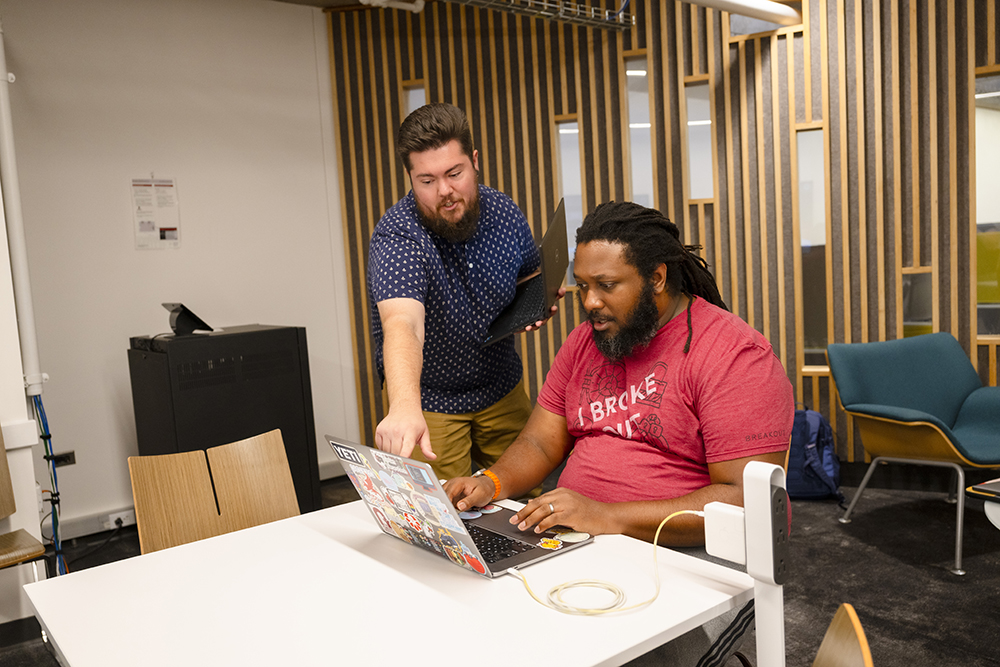
The University Libraries offers a variety of resources to help the CMU community master coding in open source programming languages and common data science tools, from workshops to recorded lessons available on YouTube. For those in need of more specialized assistance, students, staff, and faculty can also schedule virtual or in-person consultations with the Data & Code Support team.
Open source programming languages like Python and R can be a key component of open research and data science — but not every student enters college or graduate school with coding experience, and even those who do may benefit from a refresher as they dive into increasingly complicated projects. SQL, GitHub, and other data science tools also offer major advantages to researchers who need to collaborate with others, query data, or perform data analysis. Data and Code Support consultants offer the CMU community personalized advice and feedback in these areas to directly address their individual challenges.
“We want to help researchers adopt best practices for transparency and reproducibility, not just at the point of publication but also for the day to day work of data collection and analysis,” said STEM Librarian and Open Science Program Director Melanie Gainey, who is the primary contact for the service. “Whether you're in the humanities, sciences, or another field, these skills promote openness, boost efficiency, and equip you with valuable and marketable expertise for the next stage of your career.”
As consultants have advanced degrees and expertise with a wide variety of methodologies, consultations can be tailored to the specific disciplines and data relevant to a researcher’s project. For example, College of Engineering Ph.D. candidate Kester Wade researches energy affordability for U.S. households. In order to determine whether energy efficiency programs have a positive impact on household health and well-being, he needed to to learn how to clean and analyze energy meter data — which came in the form of CSV files that contained hourly electricity and gas consumption measurements from 125,000 households over a 10-year period in Tallahassee, FL.
He reached out to the Data & Code Support team for help with this overwhelming data, and was paired with Research Data Services Librarian Alfredo González-Espinoza, one of the Libraries’ Data and Code consultants.
“Alfredo took the time to thoroughly understand my research, the type of data I was working with, and the progress I had made in cleaning and transforming some of the files. He introduced me to Microsoft Copilot, and also shared valuable introductory resources on Python packages,” Wade recalled. “As someone who had never cleaned a dataset before, I was seeking guidance on how to approach the workflow, and Alfredo’s support was instrumental in helping me get started.”
In addition to individualized support, the Data and Code Support team also provides resources to help others share these key skills across campus. For instructors looking to bring knowledge of programming languages and data science tools into the classroom, materials for teaching on these topics are available on the Data & Code Support Menu. [.pdf]
Menu offerings include the Data & Code Support Canvas module, which provides a curated overview of workshops, tutorials, and tools — all designed to help students strengthen their data and coding skills. It’s easy to integrate into any Canvas course.
Further down, the menu lists a variety of asynchronous models and courses that dive more deeply into various data science topics. Platforms like Sage Campus, LinkedIn Learning, and Dataquest provide access to a growing collection of online courses reinforcing relevant skills. STEM Librarian Chasz Griego also maintains an open science data workshops page on GitHub, which includes full workshop content and curricula that instructors and students are encouraged to use for both self-guided learning and in-class sections.
Librarians are also available to support courses through direct guest instruction, designing collaborative pedagogical materials, creating new videos, helping design course-specific assignments, and additional ways requested by instructors to fit their needs.
“In my time as a CMU Librarian, I have worked with Tepper, Heinz, and Dietrich to offer in-class or workshop-centered instruction around coding and data visualization, focused on both disciplinary needs and general best practices,” said Data Education Librarian Emma Slayton. “A lot of our students struggle with final projects due to their lack of practice in telling stories with data — the Libraries is built to help with that communication!”
In the coming year, the team plans to add additional consultants, increasing their capacity for support even further. And as emerging tools like generative AI offer novel ways to engage with data and code, the service will continue to adapt to meet evolving needs.
“I believe the Data & Code Support service is incredibly beneficial and important,” Wade said. “My current research involves computationally intense data analysis, but there’s no centralized support for data quality or management within my lab group or department. Since discovering this service last summer, it has become an essential resource I rely on regularly.”
“If you attend a workshop and need follow-up help, need to build skills to dive into a project, or don’t know where to begin with learning something new, we encourage you to come chat with us,” Gainey added. “Our team is here to fill in the gaps with any support you might need in a welcoming and approachable way.”
Visit the Data & Code Support Guide to learn about additional support for working with Python, R, and data science tools. CMU Libraries also provides a wide range of Data Services beyond code support. To collaborate with the Data and Code Service team, schedule an in-person or virtual consultation or submit a quick question through the Data Services and Publishing form.
